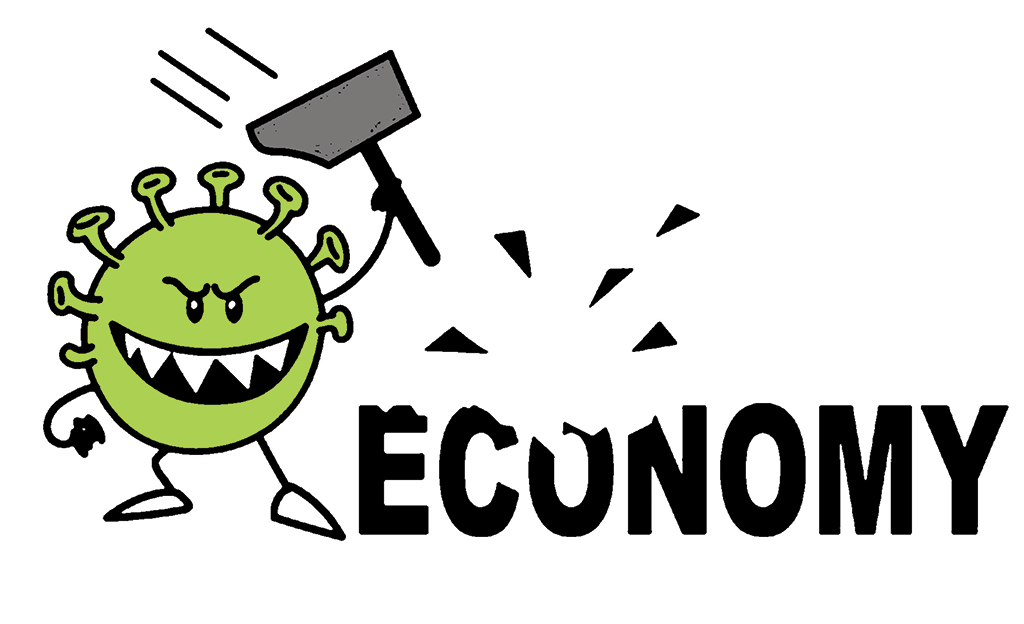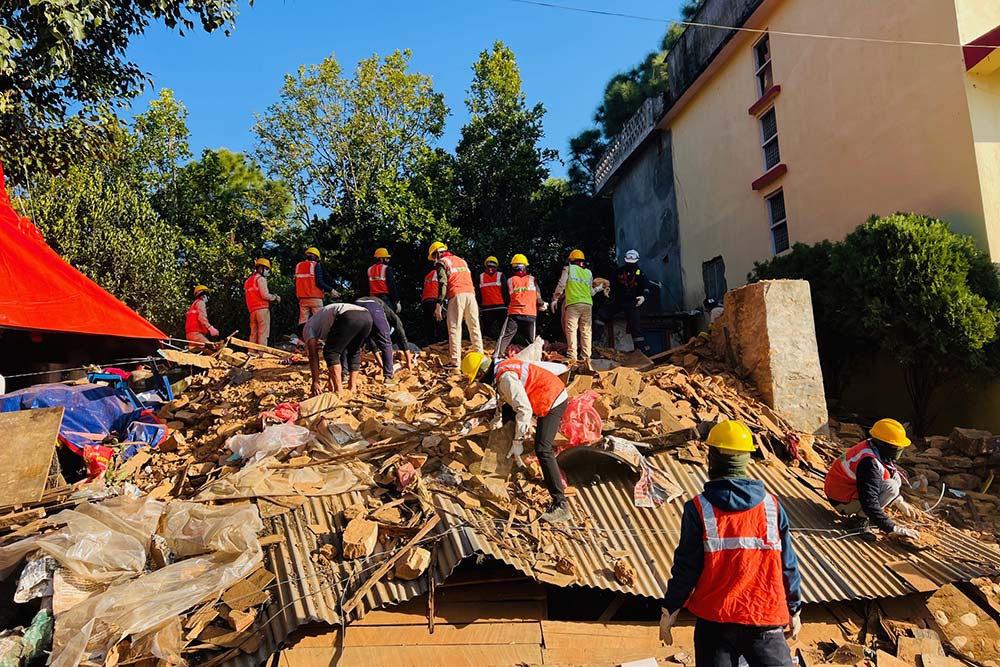
The government has declared relief package to protect daily wage earners severely hit by the slowdown in economic activities caused by the COVID-19 pandemic and the government enforced lockdown. Some facilities are being extended to taxpayers and borrowers for tax filing and loan repayment.
Government has promised to raise healthcare expenses for free treatment of COVID-19 infected and waive custom duty on import of healthcare equipment and lifesaving drugs.
The government enforced lockdown beginning March 24 to April 7, with further extension to April 15, to stem the spread of COVID-19. Nine cases have been confirmed so far. Despite the low count of cases, the government maintains that precautionary actions will be continued till the pandemic is controlled globally.
Despite movement of people being curbed and sealing of borders and airports, cargo vehicles will be allowed to move seamlessly to ensure supplies provided disinfection standards fixed by the Ministry of Health and Population and Ministry of Agriculture and Livestock are rigorously maintained.
The government has ensured food security to protect vulnerable population and daily wage earners who are facing income shocks due to the COVID-19 crisis. The government distributes relief packages of food and daily essentials from the ward level based on local government data. Guidelines of relief package comprise 30kg rice, 3kg pulses, 2kg salt, 2 liters edible oil, 2 kg sugar and 2 units of soap. Minister for Federal Affairs and General Administration, Hridayash Tripathi has announced that relief package distribution has been already started from the ward level. Apart from the government, non-governmental, charitable organisations and some individuals are also distributing relief in coordination with the local government. Art of Living, Nepal Chapter has distributed relief package to 4,000 families in Kathmandu, Bhaktapur and Lalitpur through wards, according to Bimal Kedia, a businessman and Member of Parliament.
The Ministry of Women, Children and Senior Citizens has decided to provide Rs 10,000 to senior citizens without family support and those living in community housing and religious sites.
The government has urged employers to provide salary uninterruptedly to employees including tourism businesses that have been especially hit hard by the situation for which they will be allowed to use social welfare funds until business returns to normal. The government will deposit the salaries for March-April to workers in the organised sector who are registered with the Social Security Fund.
The government's announcement on March 29 has some important provisions to extend healthcare support to general public. The government has announced free treatment for COVID-19 patients and meeting the meal requirements of those living in quarantine and hospitals. The government has also urged hospitals to provide 20% discount to patients for treatment.
It has waived custom duty on import of healthcare equipment and lifesaving drugs to minimise the cost of healthcare. To encourage frontline service providers like health workers, security personnel, ambulance drivers, volunteers, cleaners in hospitals, electricians, water suppliers among others, the government has offered an insurance scheme worth Rs 2.5 million.
Suppliers of daily essentials and groceries have been asked to take proper measures of disinfection to avoid the chances of virus spread. The government has announced that it will earmark sufficient budget for the Ministry of Health and Population to cope with the pandemic.
The government has decided to provide door-to-door delivery on essential supplies. Groceries are allowed to remain open for certain hours from 3pm to 5pm during lockdown. The Golyan Group is operating mobile shops for the supply of fruits, vegetables and daily essentials in different areas.
HIGHLIGHTS
• Landlords have been urged to exempt rent to tenants, especially wage earning tenants, for a month.
• 25% rebate on electricity tariff for those who consume up to 150 units of electricity.
• No penalty on electricity, water and telephone bills of Falgun and Chaitra. These can be cleared by the end of Baisakh.
• Nepal Telecom and private telecom service providers to offer 25% discount on data and voice call for the period of lockdown. ISPs encouraged to offer 25% discount.
• Food relief to marginalised households through local level governments throughout lockdown.
• Salt Trading to offer 10% rebate on rice, lentils, sugar, oil and salt during the crisis.
• Health Ministry to be accorded additional budget for procurement of medical supplies. Customs waiver on import of medical equipments and all drugs
• Employers directed to pay salaries of wage workers of organised and unorganised sectors
• Provincial and local level governments to establish a fund through to disburse relief materials
• Extension of deadline for paying taxes for Falgun and Chaitra. VAT, Income Tax and Advanced Tax payment deadline extended to Baisakh 25
The government has announced 10% discount on rice, flour, pulses, salt, sugar, edible oil sold by Nepal Food Corporation and Salt Trading Corporation Limited. Nepal Electricity Authority (NEA), Nepal Telecom and other private telecommunication service providers and internet service providers are asked to waive 25% on bills of mid-March to mid-April. Consumers are provided one month extension to pay bills of internet, electricity, drinking water and public utility services. NEA has been asked to provide up to 50% waiver on bills for industries.
Schools have been asked to waive a month’s fee except on food and accommodation charge of residential schools. Parents of students stranded abroad are allowed to send up to $500 and up to €300 for students stranded in Cyprus where reportedly there are over 3,000 students in the island nation of Europe.
Through the Insurance Board, insurers are asked to suspend penalties and additional charges incurred in premium submission or insurance policy renewal. Insured can make payment of the obligation 15 days after situation resumes normalcy. Likewise, the government has provided one-month deadline extension till mid-May for renewal of companies, vehicle renewal, route permit fees among others.
The government has provided deadline extension for tax filing and loan repayment. Borrowers can repay loan and interest matured in the third quarter by the end of ongoing fiscal. Those who are able to payback loan within third quarter will get 10% waiver on total interest matured within the period, as per the Nepal Rastra Bank.
Similarly, corona-hit businesses can avail subsidised credit from the refinancing window of the Central Bank to sustain and revive their business as the NRB expands its refinancing facility to Rs 60 billion from Rs 50 billion. Likewise, mandatory provision of cash reserve ratio (CRR) has been lowered to 3% from 4% which is expected to generate an additional Rs 32 to 33 billion liquidity into the financial system. NRB has taken another monetary tool to lower and stabilise the rate of lending and deposits through lowering the interest rate corridor rates or policy rates by one percentage point.
Taxpayers are allowed to submit income tax and value added tax (VAT) and tax filing details by May 7. Income tax payers must submit the details of tax deduction at source (TDS) till mid-February and income tax submission details must be submitted by May 7. Apart from this second quarter installment of income tax and tax filing details can be submitted by the mid May. Sugar mill owners are asked to clear the outstanding dues of cane growers by mid-May.
However, experts and economists have said that the initiations taken by the government and Central Bank are marginal and sorely insufficient to revive the economy hit by pandemic especially the multiple impacts such as production slump, revenue loss caused by the demand shock, job loss and impact on remittances which is a major source of foreign exchange reserve. Nara Bahadur Thapa, former Executive Director of NRB said that the steps taken by the government are simply, 'marginal' and 'insufficient' to revive the economy.
In view of impact on remittance inflow caused by COVID-19, the government has decided to curtail imports. It has banned import of vehicles above $50,000; refined alcohol (any finished product of alcohol); black pepper; peas; betel nuts and dried dates. The government has also lowered the gold import quota by half to 10kg per day for commercial banks. Only commercial banks are allowed to import gold in the country.
The March 29 announcement has decided to provide employment opportunities for those barred from foreign employment following the COVID crisis and those who have had to return from foreign employment under the Prime Minister Employment Program (PMEP).
Companies that have agreement with the government to supply goods or have been awarded contract for government works will get the facility of one-month extension of bank guarantee if it expires by mid-April. The government has also decided to request the Financial Action Task Force through Asia Pacific Group (APG) to defer the review of Effectiveness of Money Laundering Prevention in this difficult situation.
The Finance Minister has said that the government will come up with further relief and economic stimulus based on further developments.
The 16th meeting of Coronavirus Prevention High Level Committee led by Deputy Prime Minister and Defense Minister Ishwar Pokharel on April 2 has decided to ease permit for work in agriculture sector: harvesting, plantation as well as development works and operation of industries.
The liability incurred in COVID-19 response will be covered through transfer of resources and realigning of the annual budget. The federal and sub-national governments have set up COVID-19 Response Fund to raise funds and the government can use resources from other funds like National Disaster Management Fund, Prime Minister's Disaster Relief Fund, according to Finance Minister Khatiwada.
The federal government has set up Corona Prevention, Diagnosis and Treatment Fund for COVID-19 response with Rs 50 crores by the government. An additional 1.19 billion was collected in this fund through large donors like Nepal Oil Corporation and Ncell who contributed Rs 50 crores and Rs 10 crores respectively. Many corporate houses, banks, individuals have been contributing to this fund.
Besides, the government will mobilise foreign assistance to cope with the challenges mainly protecting lives, sustaining the economy and protecting jobs. The government has decided to accept $ 29 million from the World Bank Group, $50 million from Asian Development Bank and 78.5 million SDR (special drawing rights) from the International Monetary Fund (IMF) for the COVID-19 response, as per Minister Khatiwada.
The COVID-19 Crisis Management Centre (CCMC) has been established to execute important announcements, proper monitoring and coordination. The CCMC led by DPM Pokharel comprises of ministers from Ministry of Defense, Ministry of Health and Population, Ministry of Finance, Ministry of Industry, Commerce and Supplies, Ministry of Federal Affairs and General Administration as well as the head of the all security forces: Nepal Army, Nepal Police, Armed Police Force and National Investigation Department. This mechanism is dedicated to enforcing all decisions related to COVID-19 response and also to advise the government on vital decisions.





